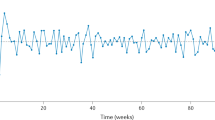
Overview
Access this book
Tax calculation will be finalised at checkout
Other ways to access
About this book
Similar content being viewed by others
Keywords
Table of contents (16 chapters)
-
Front Matter
-
Back Matter
Reviews
'Professor David Simpson has launched the most authoritative assult so far on mainstream economic thinking and the neoclassical equilibrium theory that underlies it.' - Lord David Howell, Daily Telegraph
'David Simpson has written a very important book. In his usual clear and incisive style he demolished the idea that economy is like a machine and he sets out a new paradigm. In place of the machine there is an evolving interactive system where entrepreneurship and institutions play central roles. His ideas are timely because his view of economics is consistent with the new information economy about which new-classical equilibrium analysis has little useful to say.' - Professor Colin Robinson, Editorial Director, Institute of Economic Afffairs
'a highly readable book...Simpson has had long experience of communicating with the business world.' - Samuel Brittan, Financial Times
'Simpson's work comes as something of a shock to those who believe economics to be about planning and regulation control based on the outpourings of computer forecasting models. As a counter to this warm delusion, his highly readable and provocative book is a necessary shock of iced water.' - Bill Jamieson, The Scotsman
About the author
Bibliographic Information
Book Title: Rethinking Economic Behaviour
Book Subtitle: How the Economy Really Works
Authors: David Simpson
DOI: https://doi.org/10.1057/9780230513556
Publisher: Palgrave Macmillan London
eBook Packages: Palgrave Economics & Finance Collection, Economics and Finance (R0)
Copyright Information: Palgrave Macmillan, a division of Macmillan Publishers Limited 2000
Hardcover ISBN: 978-0-333-77926-2Published: 29 September 2000
Softcover ISBN: 978-1-349-41821-3Published: 01 January 2000
eBook ISBN: 978-0-230-51355-6Published: 29 September 2000
Edition Number: 1
Number of Pages: X, 234
Topics: Macroeconomics/Monetary Economics//Financial Economics


